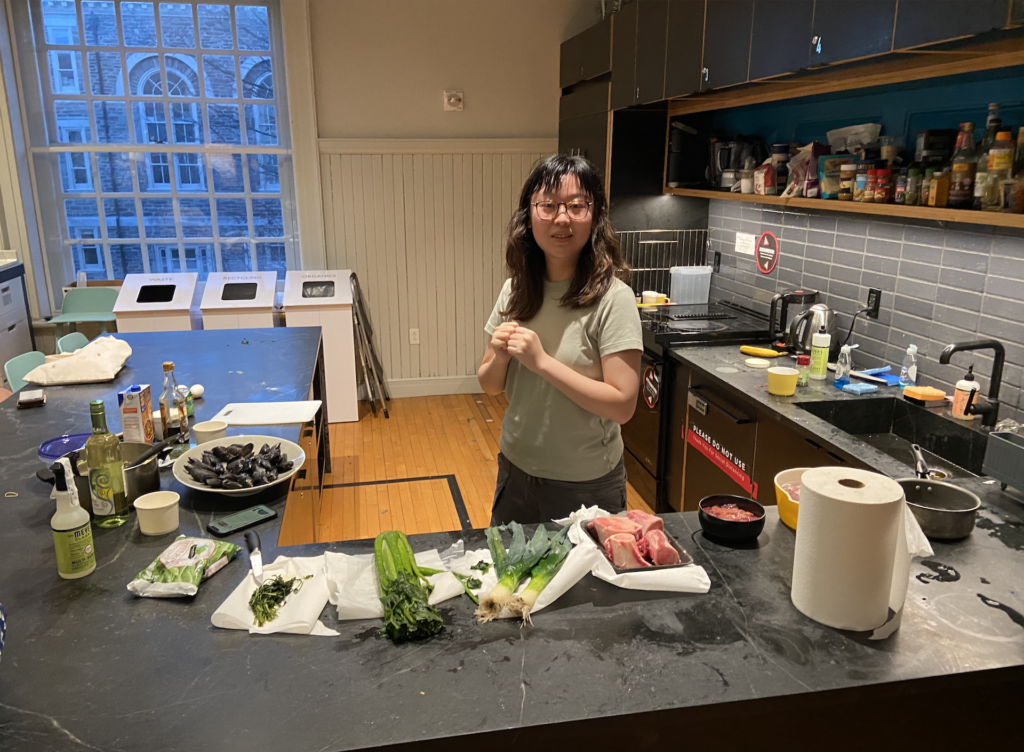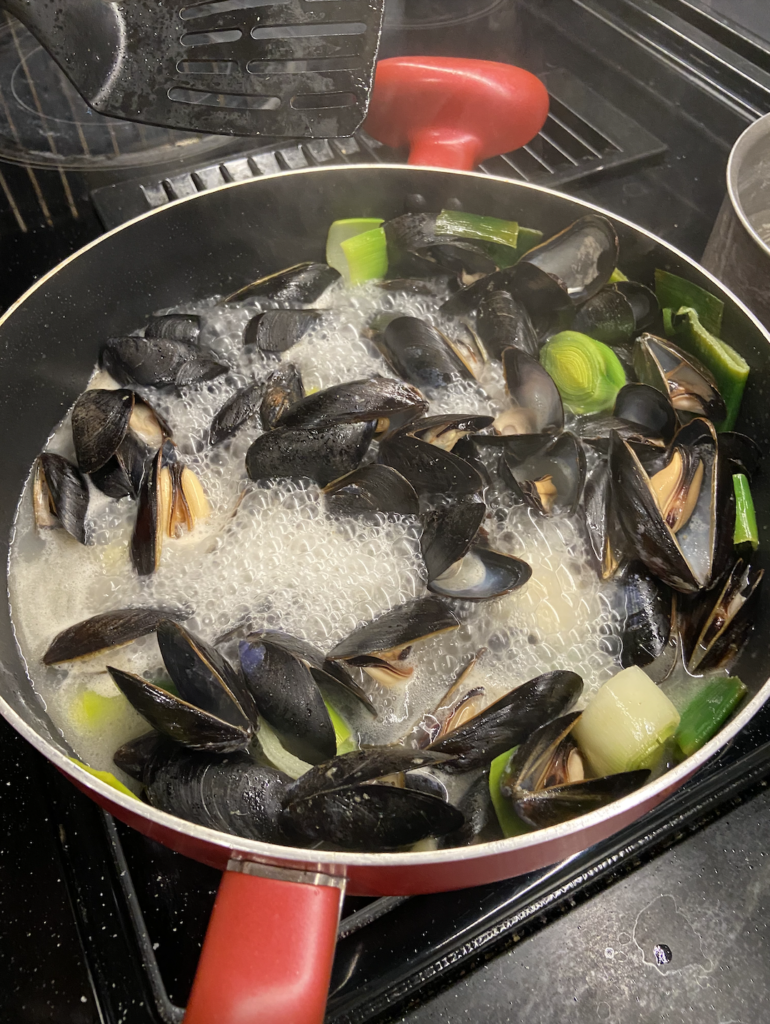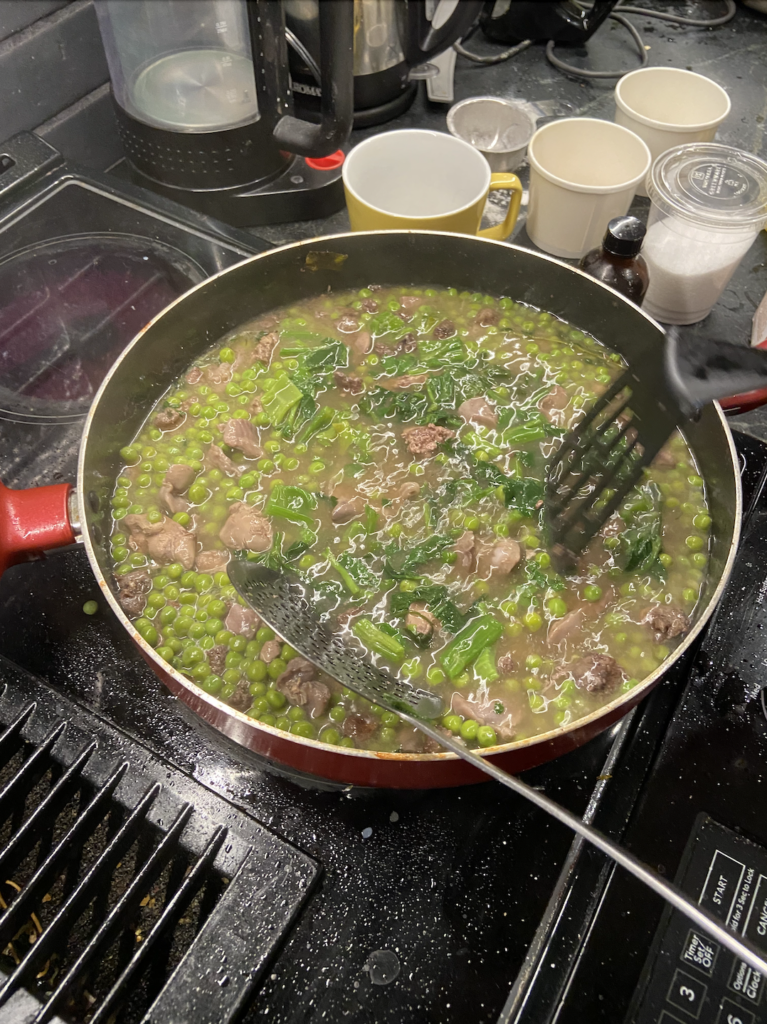Apicius: Mussels and Peas

In honor of all the suburban mothers and their live love laugh cooking blogs, it would almost be blasphemous for me to not give you my life story before I give you the recipe. As a cooking enthusiast ( more so anything but dining hall food enthusiast) and a relatively common presence at the VCAM kitchen, I have decided to cook Roman dishes the minute I learned about the existence of ACTA. Such an experiment is after all, something that I enjoy to do, something that produces a product which I actually can utilize, and something that takes me on a tour down memory lane.
My culinary experience consisted of a bizarre collage of ancient dishes lost some 2000 years ago and homely Shanghai-nese dishes my parents grew up eating. “Food to us is as important as the sky,” as the Chinese saying goes, and even now as my identity grows more and more diverse, food is something that grounds me. Long as I have my family and the food I am used to, I am at home. If food is to me an important part of my roots, it is also a pathway into understanding the distant past which I am so interested in. To put a pot of pigs trotters onto the stove and to watch it boil, repeatedly straining for hours until you finally get jelly explains better than any text the Tudor elite’s fascination with it. Similarly, a quick analysis of Victorian cuisine proves to be a better conceptualization of what the average Englishman perceived in that age of colonization than many dry words on a text. Food is one of the most intimate parts of our living experience, and to cook what they did is as much as I can do to experience their time.
That being said, most historical recipes are usually written in incredibly general terms, so that complete imitation would be nigh impossible. Though I am sure this have most certainly driven at least one food historian mad, I am actually ok with it. It. When I first learned to cook, dishes were taught to me by my father, grandmother and nanny in similar fashions of vagueness, with wordings such as “some of this, some of that” and “until the pan is hot enough, cook till it’s just right.” There is an intimate understanding between all of us that I will never make the exact same dish as any of them did by taking my own liberties, but by doing so I will truly own the dish, and the experience of making it. So I suppose, is how I see these dishes of Apicius which I am currently making.
The dishes I chose for this feast are mussels and pea soup, on the basis that both seemed interesting (also I like mussels.) I have recruited fellow classmate Jennifer as well as my other friends as taste testers, on the basis that if I did manage to give any of them food poisoning, we would be trying to claim our third ACTA in the name of “practicing Roman politics.” As far as I know, we have failed to do so.
Mussels
As Apicius puts it:
- Mussels, Liquamen, chopped leeks, Passum, savory, wine.
Dilute the wine with water, and boil the mussels in it.
How I prepared it:
- Live Mussels, 1 lb
- Some leeks, chopped
- A coffee cup of wine and possum combined ( as I was unable to acquire the latter, I used a coffee cup of wine with a bit of grape juice.)
- Fish sauce
- Thyme, to replace savory
- Half a cup of water. Add enough salt to season your twitter timeline for a week.
First, check none of the mussels are dead. Fry some leaks in olive oil in a pan, and add the mussels. Give it a light toss, and add everything else. Turn on medium high heat, and boil and stir everything until roughly half of the water has evaporated, and the mussels are sufficiently seasoned.
Reactions from the taste testers:
- Good. They finished it all, and none are poisoned. Might add this to my recipe book.

Pea soup:
As Apicius puts it:
- Peas, brains or small birds, or boned thrushes, Lucanian sausage, chicken livers and giblets
Place in a saucepan, with broth, oil and a bunch of leeks, green coriander finely chopped, cooked with pepper, lovage and broth.
As I prepared it”
- Peas, boiled
- Chicken stock
- Chicken gizzards and livers
- Bone marrow, to replace brains
- Italian sausage.
- Leeks
- Celery leaf (to replace lovage)
- coriander
Sautee the sausage, giblets, leeks and bone marrow until all is sufficiently fried. Add boiled peas, celery leaf, coriander, and chicken stock. Boil until sufficient.
Reactions from the taste testers:
- OK. Some had seconds, two refused to touch it. Too strong a celery flavor in my opinion, will not make it again.
